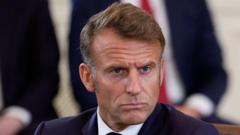Will Macron Appoint a New PM Amid Rising Tensions and Upcoming Protests?

Published: 2025-09-09 14:09:03 | Category: world
French President Emmanuel Macron is under pressure to appoint a new prime minister following the resignation of François Bayrou after losing a vote of no confidence. This political upheaval comes amid a backdrop of significant budget deficits and rising dissent from a divided parliament. With nationwide protests looming, Macron's choice of a successor will be critical for stabilising the government and addressing France's economic challenges.
Last updated: 27 October 2023 (BST)
Key Takeaways
- François Bayrou resigned after losing a vote of no confidence, prompting Macron to seek a new prime minister.
- The French parliament is hung, with no single party holding a majority, complicating governance.
- Protests against austerity measures are anticipated, with a grassroots movement calling for nationwide disruption.
- The new prime minister will need to navigate political tensions and economic challenges, including a high budget deficit.
- Macron is expected to announce a successor soon, marking his fifth prime ministerial appointment since taking office.
The Political Landscape Following Bayrou's Resignation
François Bayrou's resignation marks a significant moment in French politics, particularly as it exposes the fragility of Macron's government. Following the loss of the confidence vote, the call for a new prime minister comes against a backdrop of widespread discontent with austerity measures that have included proposed budget cuts amounting to €44 billion (£38 billion). These measures are part of an effort to address France's spiralling national debt, which currently stands at €3.3 trillion, or 114% of the country's GDP.
The French parliament is currently fragmented into three main factions, each with differing priorities and agendas. This lack of a clear majority has resulted in a political impasse, with some parties advocating for fresh elections rather than a straightforward appointment of a new leader. The situation calls for a tactful and skilled negotiator, someone capable of bridging the divides within the parliament. Macron's choice will be crucial, as the new prime minister will need to secure support from both left and centre-left factions to push through necessary budget reforms.
Implications of Austerity Measures
The austerity measures proposed by the government have stirred significant backlash, leading to the emergence of the grassroots movement known as Bloquons Tout, or "Let's Block Everything." This movement is rallying citizens to take to the streets in protest against what they perceive as governmental neglect and economic mismanagement. The planned protests have prompted the French authorities to prepare for potential unrest, with 80,000 police officers set to be deployed across the country.
Interior Minister Bruno Retailleau has warned that up to 100,000 people could participate in the protests, raising concerns about the possibility of violence and disorder. Retailleau has attributed the rising tensions to the radical left's influence, specifically pointing to the rhetoric of Jean-Luc Mélenchon, which he claims has fostered an insurrectionist climate. This political environment has resulted in heightened alertness among law enforcement and government officials, as they brace for potential disruption and unrest.
Market Reactions and Economic Concerns
Amidst the political turmoil, France's economic situation remains precarious. The country is grappling with one of the highest budget deficits in the eurozone, and a downgrade from credit agency Fitch could further complicate matters. Should Fitch decide to lower France's credit rating, it could lead to increased borrowing costs for the government, exacerbating the financial challenges already faced.
The urgency for Macron to appoint a new prime minister stems not only from the immediate political crisis but also from the need to restore confidence in France's economic management on both domestic and international fronts. A stable leadership is essential to reassure markets and to navigate the complexities of the budgetary cuts and reforms required to bring down the national debt.
Potential Candidates for the Next Prime Minister
Speculation regarding potential candidates for the prime ministerial position has been rife since Bayrou's resignation. Notable figures include Assembly speaker Yaël Braun-Pivet and current defence minister Sébastien Lecornu. Macron's decision will likely hinge on selecting someone who can command respect across party lines, particularly from the Socialists and centrist factions, who are crucial for passing any forthcoming budgetary measures.
Gabriel Attal, a former prime minister and Macron ally, has suggested that Macron should consider appointing a technocrat—someone with expertise in governance and negotiation skills. This approach could help in navigating the complex political landscape and fostering cooperation among the factions in parliament. However, the suggestion has received criticism, particularly from figures like Marine Le Pen of the National Rally, who have called for fresh elections instead of appointing a new prime minister.
Calls for National Unity
In light of the growing discontent and the potential for civil unrest, there is a pressing need for the new prime minister to embody a sense of unity and leadership. Paris police chief Laurent Nuñez has highlighted the importance of maintaining order, especially in the face of rising hate crimes, as evidenced by recent incidents targeting mosques in the region. These events underline the need for a government that not only addresses economic issues but also promotes social cohesion and security.
The atmosphere of instability in France is palpable, with many citizens feeling disillusioned by the government's response to their economic hardships and the political direction of the country. As Macron prepares to announce his choice for the next prime minister, the stakes could not be higher. The new leader will need to win over sceptical factions, quell public unrest, and effectively manage the budget crisis.
What Happens Next?
Macron's forthcoming decision will be a critical moment for the future of his administration and for France as a whole. The urgency of appointing a new prime minister reflects the immediate need for stability in governance and the economy. A successful appointment could pave the way for a more cohesive approach to addressing France's fiscal challenges, while also restoring public trust in the government.
As the announcement approaches, the nation remains on edge, watching closely to see whether Macron can navigate the intricacies of French politics and deliver a leader capable of steering the country through these turbulent times.
FAQs
What led to François Bayrou's resignation?
François Bayrou resigned after losing a vote of no confidence in parliament. His government faced strong opposition to proposed budget cuts aimed at reducing France's national debt.
What challenges does the new prime minister face?
The new prime minister will need to navigate a hung parliament, where no single party holds a majority, and address ongoing public protests against austerity measures.
What is the Bloquons Tout movement?
Bloquons Tout, which means "Let's Block Everything," is a grassroots movement in France urging citizens to protest against austerity measures and governmental neglect, calling for nationwide disruption.
How does France's national debt impact its economy?
France's national debt, currently at €3.3 trillion, represents 114% of its GDP. This high level of debt could affect borrowing costs and economic stability, making effective governance crucial.
What is the significance of the upcoming decision from Fitch?
The credit agency Fitch is expected to announce its rating of France soon. A downgrade could lead to higher borrowing costs for the government, complicating efforts to manage the national debt.
As France grapples with political uncertainty and economic challenges, the choice of a new prime minister is pivotal. Will Macron's decision restore stability, or will it exacerbate the ongoing crisis? #FrancePolitics #Macron #BudgetCrisis



